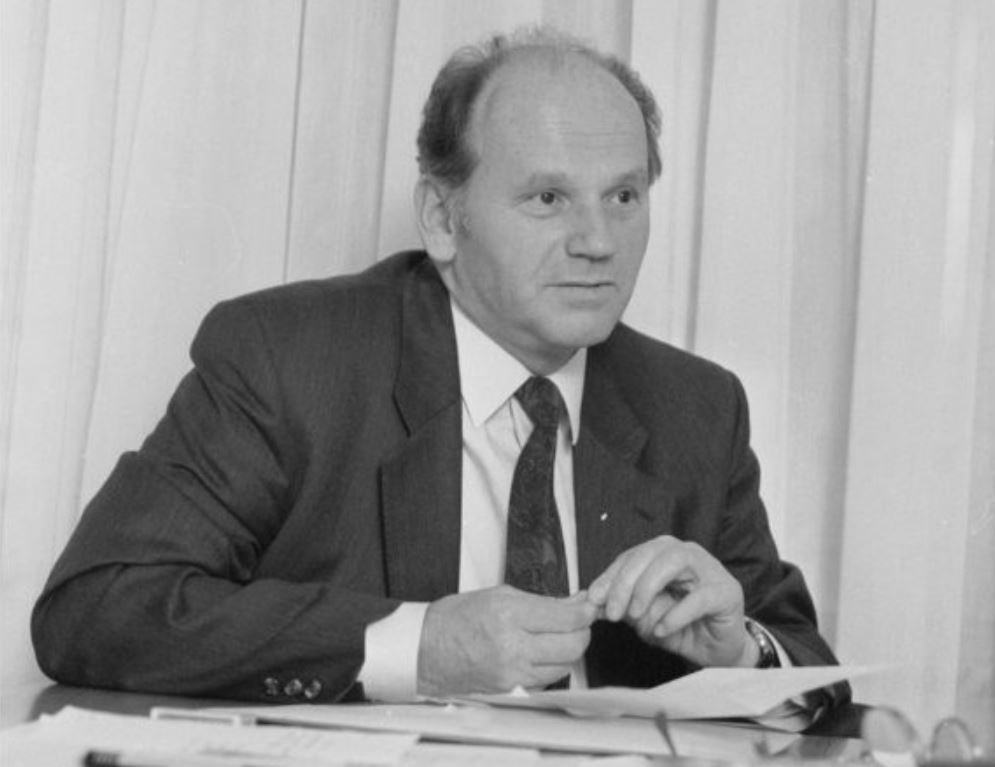Representatives of all parties of the Democratic Opposition of Slovenia, known as DEMOS, gathered on Congress Square in Ljubljana at a rally, which was not attended by the left-wing opposition. DEMOS president Dr Jože Pučnik emphasised that Slovenians are a peaceful nation and that we do not ask for anything that does not belong to us according to all human and divine commandments, and continued that “only the selfish interests of Belgrade and some others are standing in the way of our independence.”
Jože Pučnik called on the people of Slovenia not to attack those in different uniforms, as many people in the Yugoslav Army are on our side as well. He called on all elders and soldiers of the Yugoslav Army not to act against their own people, as they will bear the heaviest responsibility while the generals will remain safely hidden. He finished his speech by adding that “the power of the nation is not in the planes and armour; the power is in its will.” President of the Assembly, Dr France Bučar, emphasised that “our survival and the survival of the nation, as well as our future destiny to live as free and proud people, depend on creating our own country and thus shaping our own destiny.” The opposition attacked the event, and the response of the mainstream media was also mostly negative. Head of the Yugoslav Army’s Counterintelligence Service, Emin Malkoć, told Belgrade that DEMOS was losing support in Slovenia due to its nationalist and anti-Yugoslav policies and that the time was coming for decisive action.
The public on relations with the Yugoslav (People’s) Army
The events in Maribor (what happened in Pekre on the 23rd of May and later) showed that the situation in Yugoslavia was still very uncertain and that there is still a possibility of the Army intervening. Should Slovenia still insist on its independence after all of this? That was the question asked in the newspaper Delo’s telephone survey called Stik (contact), which was done on the 29th and 30th of May with 500 computer-selected telephone users from all over Slovenia. Results of the survey showed that the determination of citizens to continue to fight for independence did not decline, in spite of the events in Maribor. Although these events clearly showed how uncertain the whole situation is and what the Army is capable of doing, 91.4 percent of the respondents still believed that Slovenia should nevertheless insist on gaining its independence, which had been announced for the 26th of June.
Only 1.8 percent of the respondents believed that it no longer made sense to persist (as they deemed it to be too dangerous and risky, or because we did not have support abroad), 3.4 percent were unable to decide, and just as many people thought that we should consider independence at a later time or at least postpone it for now. When asked whether they believe that the Yugoslav Army might try to prevent Slovenia’s independence by force, the opinions of the respondents were much more divided. Thus, 41.2 percent of the respondents said that they believe that the Yugoslav Army would at least try to prevent independence by force, while 39.4 percent believed that that would not happen, while the rest did not know how to answer that question. 71 percent of the respondents believed that what happened in Maribor was a planned action against the independence of Slovenia by the Yugoslav Army, while 7.4 percent believed that this was a prediction of an imminent military coup that would happen throughout the country. The Slovenian Territorial Defence, which was in the centre of action in those days, was assessed as a good starting point for the creation of the future Slovenian Army by 49.6 percent of the respondents, while 24.4 percent believed that the Territorial Defence was only an emergency solution for the problem of our defence, and 10.7 percent thought the Territorial Defence was poorly organised with too many amateurs.
Defence activities
Minister of Defence Janez Janša asked General Veljko Kadijević, the Federal Secretary for People’s Defence of the Socialist Federal Republic of Yugoslavia, to explain the purpose of the Yugoslav Army’s “Bedem 91” exercise (which was actually an envisagement and preparation for a military intervention in Slovenia that was then implemented on the 26th of June), and to explain the coordination of the movements of the Yugoslav Army’s units with the competent authorities of the Republic of Slovenia. At the time, the military security service was still searching for the “internal enemy,” still controlling the Yugoslav political emigration, using illegal and even unconstitutional methods, such as secret wiretapping and recording, secret opening of personal mail, following people, secret house searches, and others.
Ministers Igor Bavčar and Janez Janša also had a meeting with the Generals of the Yugoslav Army Rašeta and Vidmar on that day, regarding the Yugoslav Army’s armoured personnel carriers, which were being repaired at the TAM factory and had “disappeared.” Bavčar and Janša demanded a written guarantee from the Yugoslav Army that the armoured vehicles would not be used on Slovenian territory. After a few days, General Kolšek sent the written confirmation, and the armoured vehicles were returned. The Yugoslav Army continued to carry out frequent vehicle and team movements in places where there were barracks and other military facilities, mainly arms and ammunition depots.


